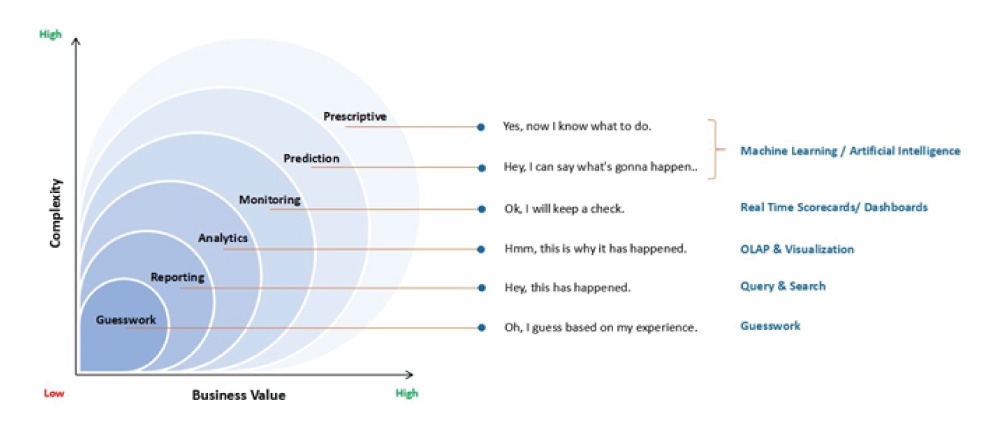‘85% of executives believe AI will change business, but only 20% of the companies are using it in some way, and just 5% make extensive use of it.’
– MIT-Boston Consulting Group Survey
AI/ML has arrived
Artificial Intelligence (AI) and Machine Learning (ML) are two of the hottest buzz words in the industry currently. Not only that, they have also become an important part of marketing jargon today. It is, after all, impossible to ignore the impact of AI/ML. While a majority of the developed world has already integrated AI into their lives and businesses, the rest of the globe is catching on at an exponential pace. The overwhelming response we received at the Martech Marathon, presented by Netcore in association with CNBC-TV18, evidenced the huge interest that domestic business community has in these technologies.

If we directly map AI and ML’s applications against the business impact they can create, we find that these technologies can help solve complex business problems that correspond to high business values.
The power of AI/ML lies in the fact that they can easily play the role of topline enhancer and bottomline booster for a business. While dipping one’s toes into AI/ML can be a daunting task for someone uninitiated, it doesn’t have to be. So long as you know what the crucial steps are, it could be as simple or as challenging as incorporating a new software. You just need to understand the usual challenges and rabbit holes down the way; for most other things, a reliable vendor to partner with will help you out.
“The essence of strategy is what not to do.”
– Prof. Michael Porter
Related Blog: How to Retain App Users using AI
Market Assessment
Organisations need to figure out exactly where all can they use AI/ML to improve their processes and customer engagement. A review of your competition’s performance as well as a review of the top performers in your segment with respect to tech adoption should help immensely. As a well-established organisation, finding out your main pain points may be a good start – find out also if these can be solved with AI/ML at any level. A great deal of information is available online but you can also seek out digital transformation experts.
Availability of the right kind of data
Did you know that nearly 80% of the data that we have today was generated in the last four years? This proves only one thing – the internet economy is the way of the future. Major innovations are quickly transforming everything around us, be it IOT, Blockchain, Bitcoin, and more. In this stream, organisations lacking in a specific focus on innovation will find this a losing battle for survival. Fuelling this internet economy is data, and having the right kind of data is everything. What is the right kind of data for you? It depends squarely on what are your business priorities, what information you need in order to grow. The right kind of data should also take into account the correctness level, data capture process, etc. AI/ML uses historical data for making predictions and in some cases, this may not hold true for the future. You will need to devise the right strategies for data collection, refinement, and continuous model monitoring among other things.
Leadership Alignment
The senior management and the leadership team in the organization need to themselves be aware about the significance of AI/ML. There are many cases in the industry where analytics personnel, including marketers and sales heads of an organization feel that the senior management is not supportive of their push for AI/ML adoption; alternatively, there are cases where the senior management thinks of AI/ML as a magic wand, expecting magical results. Both these cases pose a major challenge to departments that can truly benefit from AI/ML. For the first scenario, it’s good to court the top management for a high-level buy-in, using case studies to nurture their interest – or you could get them to read Scott Brinker’s Hacking Marketing.
Vision & Mission
Just like an organisation’s growth is a continuous process, so is the evolution of AI/ML as technology. AI/ML has learning capabilities which are developing in leaps and bounds, all it needs is the right kind of data. This understanding is crucial to getting the most out of AI/ML. You need to look into the underlying complexities of data availability, data procurement, data curation, storage etc. Generally these activities take up much more time than actually building the ML model. On a different note, you also need to be open to experimentation – what worked for your competitor may not work for you. The upside here is technology today allows businesses to experiment at a much lower cost and solutioning too is cheaper and much easier than it used to be. Often, the way to solve bigger complex problems (vision) is to solve smaller problems (mission) along the way until a clearer picture emerges. The impact might not be immediate but the results are lasting.
Having the right team
Like any field in a steep growth stage, AI/ML space is witnessing a clutter forming. An increasing number of people are joining the bandwagon but organisations are still facing a difficulty in identifying the right talent. The main reason here is the scenario is changing too fast for managers to be able to sit back and analyse their objectives and delivery. This is exactly the time when growth marketers need the right skill set to propel them forward. AI/ML adoption, especially, needs subject matter experts who should be allowed to identify skill gaps and fill them.







